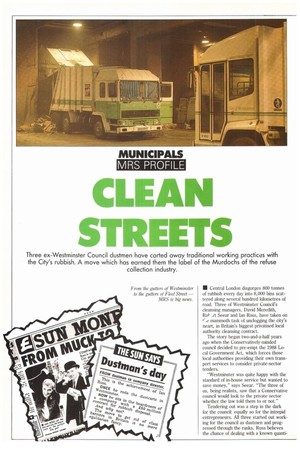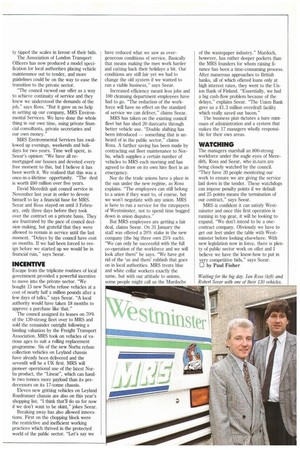CLEAN 1TREETS
Page 52

Page 53

If you've noticed an error in this article please click here to report it so we can fix it.
Three ex-Westminster Council dustmen have carted away traditional working practices with the City's rubbish. A move which has earned them the label of the Murdochs of the refuse collection industry.
• Central London disgorges 800 tonnes of rubbish every day into 8,000 bins scattered along several hundred kilometres of road. Three of Westminster Council's cleansing managers, David Meredith, Rolst Seear and Lan Ross, have taken on
mammoth task of unclogging the city's mart, in Britain's biggest privatised local authority cleansing contract.
The story began two-and-a-half years ago when the Conservatively-minded council decided to pre-empt the 1988 Local Government Act, which forces those local authorities providing their own transport services to consider private-sector tenders.
"Westminster was quite happy with the standard of in-house service but wanted to save money," says Seear. "The three of us, being realists, saw that a Conservative council would look to the private sector whether the law told them to or not."
Tendering out was a step in the dark for the council: equally so for the intrepid entrepreneurs. All three started out working for the council as dustmen and progressed through the ranks. Ross believes the chance of dealing with a known quanti ty tipped the scales in favour of their bids.
The Association of London Transport Officers has now produced a model specification for local authorities placing vehicle maintenance out to tender, and more guidelines could be on the way to ease the transition to the private sector.
"The council viewed our offer as a way to achieve continuity of service and they knew we understood the demands of the job," says Ross. "But it gave us no help in setting up our company, MRS Environmental Services, We have done the whole thing in our own time, using private financial consultants, private secretaries and our own money."
MRS Environmental Services has swallowed up evenings, weekends and holidays for two years_ Time well spent, in Seear's opinion: "We have all remortgaged our houses and devoted every free moment to this, but I believe it has been worth it. We realised that this was a once-in-a-lifetime opportunity. "The deal is worth WO million over five years.
David Meredith quit council service in November last year in order to devote himself to lay a financial base for MRS. Seear and Ross stayed on until 3 February, only three days before they took over the contract on a private basis. They are frustrated by the pace of council decision making, but grateful that they were allowed to remain in service until the last • moment. "Delays by the council have cost us months. If we had been forced to resign before we started up we would be in financial ruin," says Seear.
INCENTIVE
Escape from the triplicate routines of local government provided a powerful incentive to move into the private sector. "We bought 15 new Norba refuse vehicles at a cost of nearly half a million pounds after a few days of talks," says Seear. "A local authority would have taken 18 months to approve a purchase like that."
The council assigned its leases on 70% of the 130-strong fleet over to MRS and sold the remainder outright following a binding valuation by the Freight Transport Association. MRS took on vehicles of various ages to suit a rolling replacement programme. Six of the new Norba refuse collection vehicles on Leyland chassis have already been delivered and the seventh will be a UK first. MRS will pioneer operational use of the latest Norba product, the "Linear", which can handle two tonnes more payload than its predecessors on its 17-tonne chassis.
Eleven new gritting vehicles on Leyland Roadrunner chassis are also on this year's shopping list. "1 think that'll do us for now if we don't want to be skint," jokes Seear.
Breaking away has also allowed innovations. First on the chopping block were the restrictive and inefficient working practices which thrived in the protected world of the public sector_ "Let's say we have reduced what we saw as overgenerous conditions of service. Basically that means making the men work harder and cutting back their holidays a bit. Our conditions are still fair yet we had to change the old system if we wanted to run a viable business," says Seear.
Increased efficiency meant less jobs and 100 cleansing department employees have had to go. "The reduction of the workforce will have no effect on the standard of service we can deliver," claims Seear.
MRS has taken on the existing council fleet but has shed 20 dustcarts through better vehicle use. "Double shifting has been introduced — something that is unheard of in the public sector," claims Ross. A further saving has been made by contracting out fleet maintenance to Norba, which supplies a certain number of vehicles to MRS each morning and has agreed to draw on its own hire fleet in an emergency.
Nor do the trade unions have a place in the sun under the new regime, as Ross explains. "The employees can still belong to a union if they want to, of course, but we won't negotiate with any union. MRS is here to run a service for the ratepayers of Westminster, not to spend time bogged down in union disputes."
But MRS employees are getting a fair deal, claims Seear. On 31 January the staff was offered a 20% stake in the new company (the big three own 25% each). "We can only be successful with the full co-operation of the workforce and we will look after them" he says. "We have got rid of the 'us and them' rubbish that goes on in local authorities. MRS treats blue and white collar workers exactly the same, but with our attitude to unions, some people might call us the Murdochs of the wastepaper industry." Murdoch, however, has rather deeper pockets than the MRS founders for whom raising finance has been a time-consuming process. After numerous approaches to British banks, all of which offered loans only at high interest rates, they went to the Union Bank of Finland. "Essentially, we had a big cash-flow problem because of the delays," explains Seear. "The Union Bank gave us a £1.3 million overdraft facility which really saved our bacon."
The business plan dictates a bare minimum of administration and a system that makes the 17 managers wholly responsible for their own areas.
WATCHING
The managers marshall an 800-strong workforce under the eagle eyes of Meredith, Ross and Seear, who in.turn are being closely watched by the council. "They have 20 people monitoring our work to ensure we are giving the service laid down in the tender. These watchdogs can impose penalty points if we default and 25 points means the termination of our contract," says Seear.
MRS is confident it can satisfy Westminster and once this first operation is running in top gear, it will be looking to expand. "We don't intend to be a onecontract company. Obviously we have to get our feet under the table with Westminster before looking elsewhere. With new legislation now in force, there is plenty of public sector work on offer and I believe we have the know-how to put in very competitive bids," says Seear.
by Paul Fisher
















































































































































